|
|
|
Sort Order |
|
|
|
Items / Page
|
|
|
|
|
|
|
| Srl | Item |
| 1 |
ID:
191776
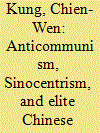

|
|
|
|
|
| Summary/Abstract |
In April 1957, Chinese educators from across the Philippines gathered in Manila for the First Convention of Chinese Schools in the country. This article comprises a translation of and commentary on the declaration that was published to commemorate the occasion. I use it to illustrate the little-known extent to which elite-authored Chinese identity in the Philippines was deeply infused with a particular strain of Cold War ideology that emphasized unyielding support for the Republic of China (ROC) on Taiwan and Sinocentrism. Texts such as these call attention to the Philippines as a largely neglected site for historicizing and differentiating among Southeast Asia’s Chinese communities after 1945. Read carefully and contextually, they offer a very different perspective on identity formation within these societies from that found in mainstream, typically Malaya-focused narratives of cultural hybridization, localization, and depoliticization.
|
|
|
|
|
|
|
|
|
|
|
|
|
|
|
|
| 2 |
ID:
191782
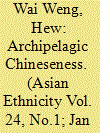

|
|
|
|
|
| Summary/Abstract |
Inspired by the concept of ‘archipelagic Islam’ and the recent academic call for archipelagic thinking, this article proposes the term ‘archipelagic Chineseness’ to analyze various discourses and practices of Chineseness that take into account diverse national and local contexts, without disregarding various transnational connections. However, different from the proponents of ‘archipelagic Islam’ who promote an ideal type of Islamic identity in Indonesia, I use ‘archipelagic Chineseness’ mainly not to prescribe a kind of ideal Chinese identity, but instead to explore and theorize multiple ways of being or not being Chinese in Indonesia, Malaysia, and beyond. The concept points to the possibility of being Chinese in a way that is neither totally subscribed to China’s growing influence, nor completely assimilated due to the demand of some nationalists. By examining the trends of Chinese-style mosques and Chinese Muslim preachers, I discuss how and under what conditions different Chinese and non-Chinese Muslims appropriate Chineseness for diverse reasons. While the Chinese-style mosques borrow the architectural design of ancient mosques in China, they adopt local cultural traditions and interact with local politics. Many Muslim leaders welcome such mosques as an initiative to promote localized Islam and to imagine a translocal Chinese Muslim identity. However, when it comes to preachers, there are contesting – if not conflicting – cultural and religious orientations, which are shaping and being shaped by the politics of race, religion and class in both countries. Thus, I propose ‘archipelagic Chineseness’ to analyze various entanglements of diverse transnational connections, national belongings and local sensibilities among ethnic Chinese in general and Chinese Muslims in particular. Archipelagic thinking around Chineseness also allows us to explore how ethnic Chinese in maritime Southeast Asia negotiate their Chineseness with their other identities, such as nationalities, localities, religion, and sexual identities.
|
|
|
|
|
|
|
|
|
|
|
|
|
|
|
|
| 3 |
ID:
191780
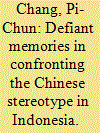

|
|
|
|
|
| Summary/Abstract |
This study considers Batavia’s first Chinese captain, Souw Beng Kong (1580–1644) as an example of the memory politics of urban Chinese Indonesians in Jakarta. It explores how and why he has been remembered in the contemporary era. While the stereotype of Chinese Indonesians has its roots in the Dutch colonial period, this study takes the Dutch institution of the captain as a framework to examine what is remembered as a way to bind group members together in a shared community of memory. This study argues that remembering Souw represents an implicit but defiant response to a long-standing negative stereotype that the ethnic Chinese in Indonesia are perennially alien outsiders.
|
|
|
|
|
|
|
|
|
|
|
|
|
|
|
|
| 4 |
ID:
191778
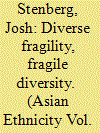

|
|
|
|
|
| Summary/Abstract |
Attending to postwar Chinese-language letters in Indonesia and the Philippines reveals a stronger tendency to write within a discourse of long-distance cultural nationalism than in hybrid or local modes. Omitting cultural nationalist discourses from a view of the corpus risks skewing accounts of Sinophone production, since many authors who write in Chinese have been receptive to ethnic, cultural, and even political appeals from China. This result is also ironic, in that it is specifically production in Chinese (rather than in imperial or archipelagic languages) which is most in tension with the postmodern and postcolonial bent of the Sinophone turn. As an open system for interrogating essentialist definitions of ‘Chineseness’, Sinophone Studies should also accommodate the culturally (and sometimes politically) orthodox ‘Chinese’ strands of Southeast Asian writing. Considering non- or less-hybrid strands of the corpus in turn opens new avenues for understanding the region’s Sinophone cultural production as the result of a rich, politically diverse network with considerable scope for comparative intraregional study.
|
|
|
|
|
|
|
|
|
|
|
|
|
|
|
|
| 5 |
ID:
191777
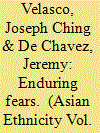

|
|
|
|
|
| Summary/Abstract |
This paper examines enduring fears and anxieties about ‘Chineseness’ that widely and persistently circulate in the Philippine cultural imaginary. Chinese Filipinos have historically been implicated in a prejudicial politics of recognition within the Philippine postcolonial state, which has attempted to forge a national identity through problematic notions of ethnic and cultural purity. To undermine what Franz Fanon calls the pitfalls of national consciousness, scholars have often turned to concepts such as syncretism and hybridity, which celebrates heterogeneity and diversity as it opposes essentialism and purity. The agenda of this paper, however, is to examine the forces that generate obstacles to an affirmative politics of cultural assimilation and belonging. Toward that goal, we offer a symptomatic reading of the film Feng Shui (2004), which we suggest condenses anxieties about Chineseness that circulate in the Philippine cultural imaginary, anxieties that amplify difference and potentially undermine the reparative force of hybridity.
|
|
|
|
|
|
|
|
|
|
|
|
|
|
|
|
| 6 |
ID:
191779


|
|
|
|
|
| Summary/Abstract |
During the New Order period (1966–1998), Chinese Indonesians or Tionghoa were systematically excluded from Indonesian accounts of history. After the fall of the regime, there was a resurgence of writing by and about Chinese Indonesians. One element of this resurgence was the translation into Indonesian of books by Western writers on the topic, but more important has been the emergence of new publications in Indonesian in which Sino-Indonesians are given a central position in major events or phenomena, such as the introduction of Islam to the Indonesian archipelago. The New Order’s exclusion of Sino-Indonesians has been transformed into an inclusive narrative. Significantly, Indonesians who are not of Chinese background have played an important role in bringing about this historical resurgence. These changes represent a major shift in the way the Indonesian nation is being defined.
|
|
|
|
|
|
|
|
|
|
|
|
|
|
|
|
| 7 |
ID:
191775


|
|
|
|
|
| Summary/Abstract |
This paper examines the historical antecedents of the terminologies ascribed to the Chinese in the Philippines, focusing on the late Spanish to the early American colonial periods. Many government records, newspapers, or books categorized the “Chinese” as either sangley, intsik, Chinese mestizo, or “Chinese/Chino,” in contradistinction to Christianized natives who were labeled as “Indios” and later “Filipinos.” Following dominant and nationalized classifications of race, past scholarship on the Chinese in the Philippines also tended to paint the “Chinese” in the Philippines in a binarist opposition against “Filipinos.” The essentialization of ethnicities has resulted in the perpetuation of a homogenized and monolithic “Chinese” identity that we see in the country today. Using government and non-government publications from the period under study, this paper seeks to demonstrate the power dynamic at particular moments in Philippine society that has led to the reification, reinvention, and reconfiguration of what it means to be “Chinese.”
|
|
|
|
|
|
|
|
|
|
|
|
|
|
|
|
| 8 |
ID:
191774
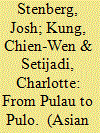

|
|
|
|
|
| Summary/Abstract |
Southeast Asia is an important region for working through questions of Chineseness. It is, however, a notoriously heterogeneous region, and conclusions derived from some parts of it can be of limited applicability elsewhere. This special issue offering empirically-grounded, multi-disciplinary research engages with and expands on existing scholarship on Southeast Asia’s Chinese. By focusing on Indonesia and the Philippines, the articles in this special issue investigate diverse models of being Chinese in Southeast Asia and depart from the familiar paradigms offered by Singapore and Malaysia, where ethnic Chinese populations are in the highest proportions and hold significant political power, and where Anglophone institutions transmute formulations of Chineseness into academic and political discourse. In so doing, we call for recognising diversity within Chinese communities in the region, not only among localised, hybrid expressions of Chineseness, but in the coexistence of both hybridity and persistent identification with Chineseness in multiple forms.
|
|
|
|
|
|
|
|
|
|
|
|
|
|
|
|
| 9 |
ID:
191781
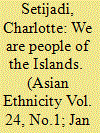

|
|
|
|
|
| Summary/Abstract |
The Riau Islands Chinese are an anomaly in the study of Chinese Indonesians. For one, while many of their ethnic Chinese counterparts in other parts of Indonesia can no longer speak Chinese due to the New Order regime’s assimilation policy, Chinese languages are alive and well in the Riau Islands. Based on ethnographic fieldwork conducted in 2017–2018, this paper seeks to understand the Riau Islands Chinese’s cultural resilience and sense of belonging as a borderland ethnic minority. I argue that long-standing inter-Island and cross-border mobilities and cultural flows with Singapore have been central to the maintenance of Riau Islands Chinese identity. Utilising translocality as a theoretical framework to understand the processes of identity formation and place-making that transcend national borders, I contend that the case study of the Riau Islands Chinese challenges the conventional state-centric modes of analyses prevalent in the study of ethnic Chinese communities in Southeast Asia.
|
|
|
|
|
|
|
|
|
|
|
|
|
|
|
|
|
|
|
|
|